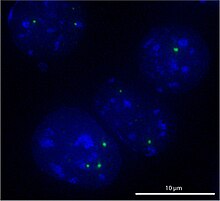
Back جسيم كاخال Arabic Cajalovo tělísko Czech Cajal-Körper German Cuerpo de Cajal Spanish جسم کاخال Persian Corps Cajal French Corpo de Cajal Galician Corpo di Cajal Italian カハール体 Japanese Cajallichaam Dutch

Cajal bodies (CBs), also coiled bodies, are spherical nuclear bodies of 0.3–1.0 μm in diameter found in the nucleus of proliferative cells like embryonic cells and tumor cells, or metabolically active cells like neurons. CBs are membrane-less organelles and largely consist of proteins and RNA. They were first reported by Santiago Ramón y Cajal in 1903, who called them nucleolar accessory bodies due to their association with the nucleoli in neuronal cells.[1] They were rediscovered with the use of the electron microscope (EM) and named coiled bodies, according to their appearance as coiled threads on EM images, and later renamed after their discoverer.[2] Research on CBs was accelerated after discovery and cloning of the marker protein p80/Coilin.[3] CBs have been implicated in RNA-related metabolic processes such as the biogenesis, maturation and recycling of snRNPs, histone mRNA processing and telomere maintenance. CBs assemble RNA which is used by telomerase to add nucleotides to the ends of telomeres.[4]
- ^ Cajal SR (1903). "Un sencillo metodo de coloracion selectiva del reticulo protoplasmico y sus efectos en los diversos organos nerviosos de vertebrados e invertebrados". Trab Lab Investig Biol Univ Madr. 2: 129–221.
- ^ Gall JG, Bellini M, Wu Z, Murphy C (December 1999). "Assembly of the nuclear transcription and processing machinery: Cajal bodies (coiled bodies) and transcriptosomes". Molecular Biology of the Cell. 10 (12): 4385–4402. doi:10.1091/mbc.10.12.4385. PMC 25765. PMID 10588665.
- ^ Andrade LE, Chan EK, Raska I, Peebles CL, Roos G, Tan EM (June 1991). "Human autoantibody to a novel protein of the nuclear coiled body: immunological characterization and cDNA cloning of p80-coilin". The Journal of Experimental Medicine. 173 (6): 1407–1419. doi:10.1084/jem.173.6.1407. PMC 2190846. PMID 2033369.
- ^ Zhao Y, Abreu E, Kim J, Stadler G, Eskiocak U, Terns MP, et al. (May 2011). "Processive and distributive extension of human telomeres by telomerase under homeostatic and nonequilibrium conditions". Molecular Cell. 42 (3): 297–307. doi:10.1016/j.molcel.2011.03.020. PMC 3108241. PMID 21549308.